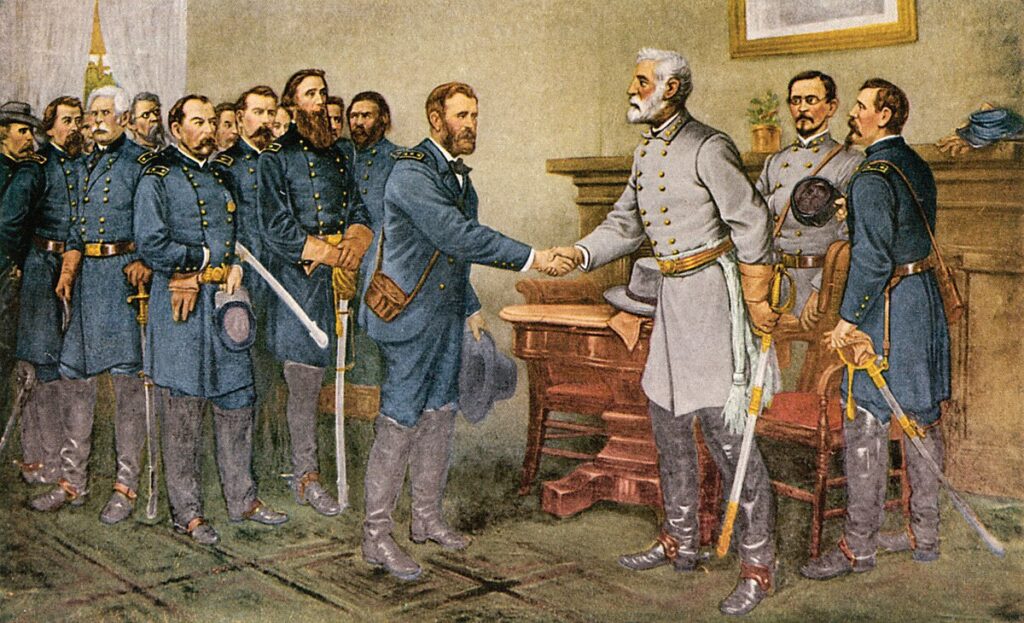This spring I realized that many of America’s most significant wartime events either started or ended in years that end in a 5, and in an uncanny coincidence, April is the month when many of these events occurred. I’m kind of obsessed with historical anniversaries and remember realizing a couple of years ago that 2026, would be the 250th Anniversary of America’s Declaration of Independence. Maybe this obsession with anniversaries was because in 1976, as a 9-year-old, it seemed like the whole world was celebrating America’s 200th birthday – the Bicentennial – which I’m sure almost everyone reading this article remembers something about. I remember the excitement of getting my first Bicentennial Quarter, and now I think imagine having a bicentennial quarter for every time we’d heard the word bicentennial that year? Even though this event would take place in JULY of 1976, we learned about it in school for months before and we, the students of Sacred Heart School in Glendale, buried a time capsule in that memorable year. We were probably one of hundreds of schools across America that buried time capsules in 1976, and as I recall the plan was to open it in 50 years, May 24, 2026, to be exact, so this should prove to be an exciting historical event for Glendale. But let us not forget that the anniversaries of which you are about to read, while significant, represent hundreds of thousands of civilians and soldiers who lost their lives for our country.
The American Revolutionary War
Starting with the oldest “American” anniversary that occurred in the month of April, in a year ending in a 5, America just celebrated the 250th anniversary of The Midnight Ride of Paul Revere which took place on April 18, 1775. Interestingly, historians now tell us that Revere wouldn’t have been shouting, “The British are coming!”, because everyone in the British colonies were considered British. Instead, Revere would have been warning, “the Regulars are about!”, the term used for the King of England’s soldiers. The day after that, April 19, 1775, was the Battles of Lexington and Concord, so the 250th anniversary of “the shot heard round the world”, signifying the start of the American Revolution seems to have passed without much fanfare.
The American Civil War
Ninety years later in April of 1865 the end of the American Civil War was celebrated, and most were relieved the killing was over, but it also left many Southerners bitter. When the Confederate Capitol of Richmond, Virginia fell to Union Troops on April 3 not all fighting had ceased, but subsequently on April 9 when General Robert E. Lee surrendered to General Ulysses S. Grant at Appomattox Courthouse, that is the date most people chose to remember as the end of the war. Tragically, less than a week later, President Abraham Lincoln was shot on April 14 by southern sympathizer, and famous actor John Wilkes Booth. So, this past April 15 was the 160th Anniversary of the death of Abraham Lincoln. Finally on April 27 the Steamboat Sultana had a catastrophic boiler explosion killing over 1,800 passengers, many of whom were Union Troops finally coming home after enduring the atrocities at the Confederate Prison Camp at Andersonville.
World War II
Eighty years later would be the end of World War II. The Battle of Okinawa began April 1, 1945. April 11 was the 80th anniversary of the liberation of the Buchenwald concentration camp in Germany, and President Franklin D. Roosevelt died on April 12, 1945. Adolf Hitler committed suicide in his bunker on April 30, and it was also in April 1945 that my uncle, Robert Aitchison, was MIA after his plane was shot down over the Pacific Ocean, but he was later rescued and survived!
The Vietnam War
1965 was the year the United States significantly escalated its involvement in Vietnam. We’d been involved in Southeast Asia since the early 1950s, and in 1955 President Eisenhower sent a military group to train the South Vietnamese Army. But the spring of 1965 was when Operation Rolling Thunder, a U.S. bombing campaign against North Vietnam began. On April 1, 1965, the first U.S. ground troops, the Marines, arrive in South Vietnam to protect air bases. But it was on November 14, 1965, the day I was born, that the first major battle between the U.S. and the North Vietnamese forces began. It took place in the La Drang Valley and resulted in heavy casualties on both sides.
A decade later, April 29 and 30 of 1975 North Vietnamese forces captured Saigon, capital of South Vietnam, and the U.S. embassy was evacuated by helicopter. The surrender of the South Vietnamese government marked the end of the Vietnam War. And I wonder how the 50th anniversary of the end of that most tragic war passed without me hearing anything on any of the media platforms I visit or watch.



